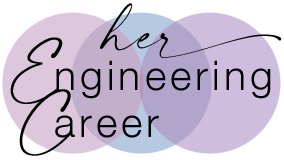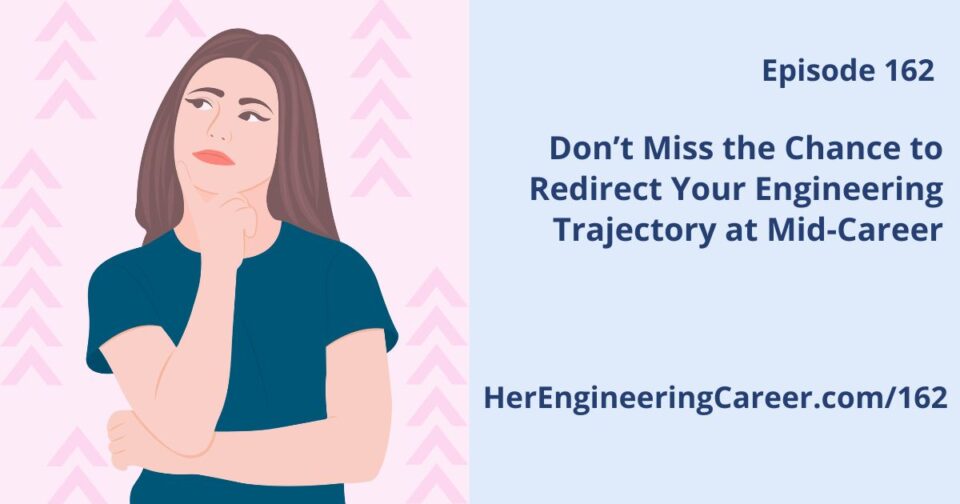Episode Transcript
Your engineering career path from beginning to end won’t be a smooth one.
There are shifts and changes along the way. Transitions that help you get back on course.
Or introduce you to new challenges. Or push you forward.
At this point you’re pretty comfortable with your engineering role.
You’re used to the kind of work you need to do to meet the mission.
You feel good about your work and you’re eager to apply your skills and talents.
But what can happen is you get into a recurring routine.
Time goes by fast. You don’t realize you need to up your game.
And you completely miss your mid-career transition point.
You miss your opportunity to shift to a more impactful role.
Mid-Career Transition – A Defining Moment in Your Engineering Career
Your mid-career transition is your opportunity to make a significant change that sets the course for the rest of your engineering career.
It’s a defining moment.
It’s the place where you convert your role as primarily a learner to one as a leader.
Where you move from following guidance to giving it.
From team participant to independent thinker.
From merely meeting the mission to defining it.
Throughout your career, your perception matures from worker focus to leader focus to executive focus.
And your mid-career transition is what triggers that.
Eventually your concern isn’t “How can I contribute?” but “Where can I take this organization?”
If you haven’t made your mid-career transition, you won’t reach this level.
And what I don’t want you to do is get into your late career and realize you missed this step.
You should expect a mid-career transition point and watch for it.
Here’s how to anticipate your mid-career transition point. And take advantage of the potential it unlocks for you.
How to Anticipate Your Engineering Mid-Career Transition
You’ve been following a strategy up to now that has established you as an engineer.
You’ve been learning the ropes. Finding your unique contributions and strengths.
Discovering how to own your career. And building confidence and risk tolerance.
Right around mid-career is the time to take on a more significant challenge.
So be on the lookout for what that might be.
For example:
- Pay attention to your interests.
Including the kind of work you like to do, the roles you see yourself taking, and positions that attract and fascinate you.
If you have many interests, list them in priority order and narrow them down a bit.
- Work with your mentors to figure out your potential roles and positions.
Think about the ones that stretch you. And tie to your energetic center.
- Explore your options.
Find opportunities that may be open to you now or in the future.
Talk to people who do the kind of work you’d like to do.
Once you’re ready to make your mid-career transition, here are 3 actions you can take:
- Share your goals and preferences with influential people.
Including hiring managers and others in your network.
This is a very important part of self-advocacy.
That way you’ll hear about opportunities. And be able to garner the support you need for taking on a more challenging position.
- Investigate potential job requirements. Seek any necessary training and work experience that will help you land the position you want.
There may be a few gaps for you to fill in.
But remember you don’t have to meet all requirements to apply for a position.
- Follow up on options that interest you.
Apply and interview for positions. Or negotiate for assignments or appointments.
If you need help recognizing your transition opportunities, or pursuing them, I’ll be glad to help you with that.
Sign up for a strategy session with me, and we’ll lay out a plan that sets the stage for your future engineering career success.
It’s Never Too Late to Make a Shift in Your Engineering Career
If you miss your mid-career transition, you might not even notice it slip by.
But afterwards you’ll notice that your career is missing something.
This is exactly what happened to me.
I didn’t make a mid-career transition. And later in my career I realized something was missing.
I was behind in challenging myself in more impactful roles.
I saw many of my colleagues pass me by before I figured out what was going on.
But not to worry. If you do miss this transition in your mid-career, it’s not too late.
You have what you need to move into a more impactful role at any time in your engineering career.
Even though you may miss out on a couple opportunities, you can still make that course correction successfully.
I invite you to be proactive in anticipating and pursuing your mid-career transition.
It’s a key pivot point between establishing yourself as an engineer and launching your career down a more rewarding path.
Next time on Her Engineering Career Podcast we’ll explore overwhelm in your engineering job: what causes it and how to get rid of it.
Be sure to join me for Episode 163.

